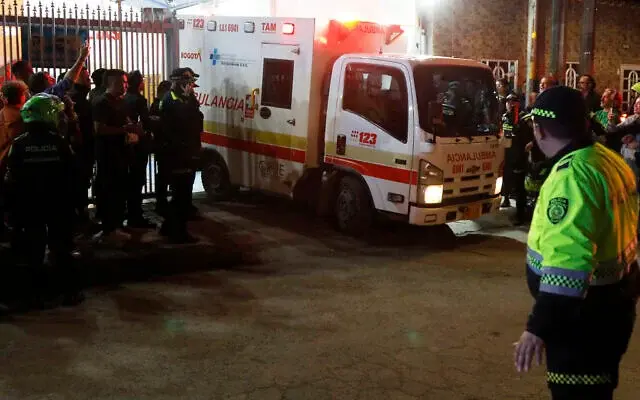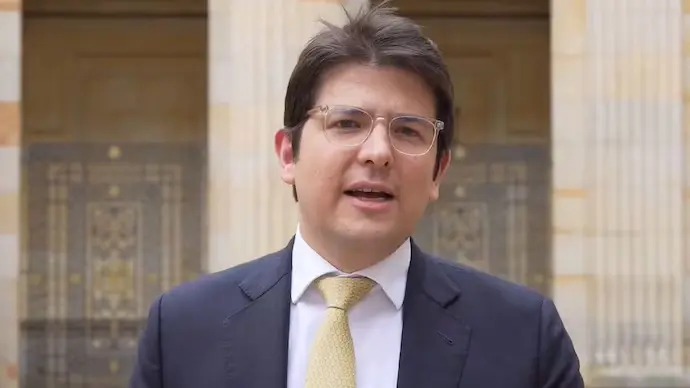During a campaign speech at El Golfito Park in Fontibón, Bogotá, on Saturday evening, Senator Miguel Uribe was shot from behind by a teenage assailant. The 39-year-old was struck in the head and chest, collapsing amid screams; a mix of bodyguards and bystanders quickly subdued the attacker, later identified as a 15‑year‑old minor now in custody.
Authorities transferred Uribe by helicopter to Clínica Fundación Santa Fe in Bogotá, arriving late that evening. Emergency neurosurgical and vascular procedures began shortly thereafter.
What Happened? – Miguel Uribe Shot at Rally
As of Sunday, medical reports described Uribe as in critical but stable condition following surgery. Bogotá’s mayor confirmed he had passed initial operations, marking the “critical hours” of recovery.

Uribe’s wife echoed the hope, stating he “fought the first battle and continues to fight for his life.” Two other individuals were also wounded in the attack, though their conditions remain less clear.
Who Is Miguel Uribe?
Born in 1986 in Bogotá, Miguel Uribe entered politics early, serving on the Bogotá city council before becoming government secretary. Elected to the Senate in 2022 as a member of the conservative Democratic Centre party, he is currently a pre-candidate for the 2026 presidential election.

His lineage ties him to a notable political family: he is the grandson of former President Julio César Turbay Ayala and son of journalist Diana Turbay, who died after being kidnapped by Pablo Escobar’s Medellín cartel.
The Assailant and Possible Motive
The 15-year-old attacker was immediately detained at the scene with a 9 mm Glock-style weapon. Investigations have begun to determine whether the teen acted alone or was part of a broader conspiracy, although no political motive has yet been identified.
Despite the lack of clarity on motive, the incident has struck a nerve in Colombia, where the political assassinations of the 1980s and ’90s — such as that of presidential candidate Luis Carlos Galán in 1989 — remain dark chapter reminders.
National and International Reaction
The attack drew immediate condemnation across the political and international spectrum:
-
President Gustavo Petro halted his international trip to focus on the investigation, calling the shooting an “attack on democracy” and pledging full accountability.
-
The Defence Minister announced a 3 billion peso (~US $730,000) reward for information leading to the arrest of any additional perpetrators.
-
U.S. Secretary of State Marco Rubio branded the shooting a “direct threat to democracy” and urged protective action for all political leaders.
-
Other Latin American leaders — including President Gabriel Boric of Chile and Ecuador’s Daniel Noboa — also denounced the violence, condemning all attacks on the democratic process.
Grim Reminder of Colombia’s Political Turmoil
Colombia remembers all too well the assassinations of public figures in the late 20th century. The attack on Miguel Uribe echoes the tragic killing of Luis Carlos Galán in 1989 and other political murders meant to silence reform voices.
While the 2016 peace agreement helped calm decades of armed conflict, this shooting highlights lingering vulnerabilities during election cycles and underscores the importance of ensuring candidate security.
What Comes Next?
With Uribe still in critical care, attention turns to the judicial and security response:
-
Law enforcement continues probing whether the teen was a lone actor or part of a coordinated attempt.
-
A significant reward aims to unearth any networks linked to the case.
-
Meanwhile, Uribe’s campaign has been suspended indefinitely, and national security measures are under renewed scrutiny.
The shooting of Miguel Uribe marks a jarring flashpoint in Colombia’s upcoming electoral season. As he recuperates in Bogotá, the nation confronts the stark reality that today — as its politicians campaign for the future — its democratic foundations remain under threat. How authorities respond will likely influence voter confidence and candidate safety for years to come.




